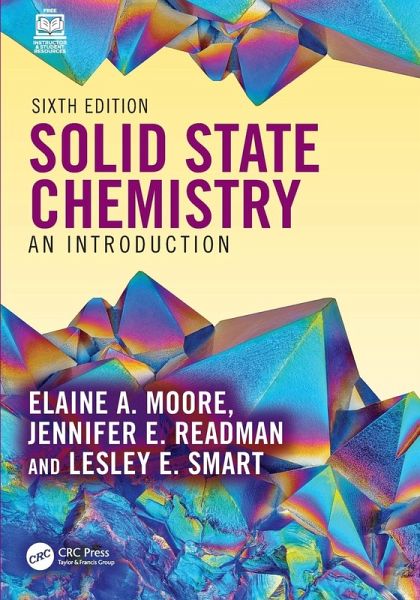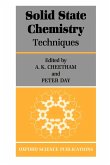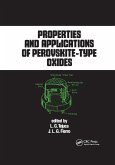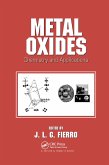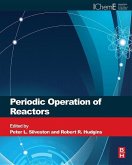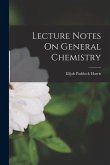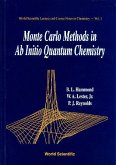- Broschiertes Buch
- Merkliste
- Auf die Merkliste
- Bewerten Bewerten
- Teilen
- Produkt teilen
- Produkterinnerung
- Produkterinnerung
Solid-state chemistry is still a rapidly advancing field, contributing to areas such as batteries for transport and energy storage, nanostructured materials, porous materials for the capture of carbon dioxide and other pollutants.
Andere Kunden interessierten sich auch für
![Solid State Chemistry Solid State Chemistry]() A. K. CheethamSolid State Chemistry142,99 €
A. K. CheethamSolid State Chemistry142,99 €![Properties and Applications of Perovskite-Type Oxides Properties and Applications of Perovskite-Type Oxides]() Properties and Applications of Perovskite-Type Oxides93,99 €
Properties and Applications of Perovskite-Type Oxides93,99 €![Metal Oxides Metal Oxides]() Metal Oxides94,99 €
Metal Oxides94,99 €![Cambridge A2 Level Chemistry 9701 Cambridge A2 Level Chemistry 9701]() Azhar Ul Haque SarioCambridge A2 Level Chemistry 970137,99 €
Azhar Ul Haque SarioCambridge A2 Level Chemistry 970137,99 €![Periodic Operation of Chemical Reactors Periodic Operation of Chemical Reactors]() P L SilvestonPeriodic Operation of Chemical Reactors163,99 €
P L SilvestonPeriodic Operation of Chemical Reactors163,99 €![Lecture Notes On General Chemistry Lecture Notes On General Chemistry]() Elijah Paddock HarrisLecture Notes On General Chemistry21,99 €
Elijah Paddock HarrisLecture Notes On General Chemistry21,99 €![Monte Carlo Methods in AB Initio Quantum Chemistry Monte Carlo Methods in AB Initio Quantum Chemistry]() Brian L HammondMonte Carlo Methods in AB Initio Quantum Chemistry62,99 €
Brian L HammondMonte Carlo Methods in AB Initio Quantum Chemistry62,99 €-
-
-
Solid-state chemistry is still a rapidly advancing field, contributing to areas such as batteries for transport and energy storage, nanostructured materials, porous materials for the capture of carbon dioxide and other pollutants.
Hinweis: Dieser Artikel kann nur an eine deutsche Lieferadresse ausgeliefert werden.
Hinweis: Dieser Artikel kann nur an eine deutsche Lieferadresse ausgeliefert werden.
Produktdetails
- Produktdetails
- Verlag: Taylor & Francis Ltd
- 6. Auflage
- Seitenzahl: 440
- Erscheinungstermin: 17. April 2025
- Englisch
- Abmessung: 254mm x 178mm
- Gewicht: 453g
- ISBN-13: 9781032728872
- ISBN-10: 1032728876
- Artikelnr.: 72108313
- Herstellerkennzeichnung
- Libri GmbH
- Europaallee 1
- 36244 Bad Hersfeld
- gpsr@libri.de
- Verlag: Taylor & Francis Ltd
- 6. Auflage
- Seitenzahl: 440
- Erscheinungstermin: 17. April 2025
- Englisch
- Abmessung: 254mm x 178mm
- Gewicht: 453g
- ISBN-13: 9781032728872
- ISBN-10: 1032728876
- Artikelnr.: 72108313
- Herstellerkennzeichnung
- Libri GmbH
- Europaallee 1
- 36244 Bad Hersfeld
- gpsr@libri.de
Elaine A. Moore studied chemistry as an undergraduate at Oxford University and then stayed on to complete a DPhil in theoretical chemistry with Peter Atkins. After a two-year postdoctoral position at the University of Southampton, she joined the Open University in 1975, becoming a lecturer in chemistry in 1977, senior lecturer in 1998, and reader in 2004. She retired in 2017 and currently has an honorary position at the Open University. She has produced OU teaching texts in chemistry for courses at levels 1, 2, and 3 and written texts in astronomy at level 2 and physics at level 3. She is coauthor of Metals and Life (RSC Publishing, 2009) and of Concepts in Transition Metal Chemistry (RSC Publishing, 2010), which were part of a level 3 Open University course in inorganic chemistry and co-published with the Royal Society of Chemistry. She was team leader for the production and presentation of an Open University level 2 chemistry module delivered entirely online. She is a Fellow of the Royal Society of Chemistry and a Senior Fellow of the Higher Education Academy. She was co-chair for the successful Departmental submission of an Athena Swan bronze award. Her research interests are in theoretical chemistry applied mainly to solid-state systems and is author or coauthor of over 50 papers in refereed scientific journals. A long-standing collaboration in this area led to her being invited to help run a series of postgraduate workshops on computational materials science hosted by the University of Khartoum. Jennifer E. Readman Jennifer is a Senior Lecturer in Materials Chemistry and Course Leader for BSc (Hons) and MChem Chemistry. Jennifer's background is in solid state inorganic chemistry and she teaches various aspects of inorganic and physical chemistry on the undergraduate and postgraduate degrees programmes. Her research is based predominately into microporous materials, such as zeolites, metal substituted silicates. She is interested in all aspects of their chemistry such as their synthesis, structure and uses. Jennifer teaches many different aspects of inorganic and physical chemistry across all year of the undergraduate chemistry programmes. Topics include Structure & Bonding in inorganic chemistry. X-ray diffraction, Chemistry of the s and p block elements, Introductory d-block chemistry, Advanced structural techniques, Group theory and Advanced Materials Chemistry. She is the Course Leader for the undergraduate BSc(Hons) and MChem Chemistry programmes. Research interests lie in the area of solid state chemistry and particularly in the relationship between the structure of a material and it's properties. Main interests lie in materials such as zeolites, metal-organic frameworks and metal silicates, and also techniques such as powder X-ray diffraction in the laboratory and at synchrotron sources such as the Diamond Light Source. These materials have applications in industry, predominately in the treatment of nuclear and pharmaceutical waste. Dr Readman is also interested in diffuse scattering, electron microscopy, X-ray fluorescence spectroscopy and solid state NMR. Dr Readman was awarded a Bachelors degree in chemistry from the University of Oxford and then went on to study for a PhD at the University of Birmingham under the supervision of Dr. Paul Anderson. The PhD work involved the use of zeolite frameworks to acts as host for metal and metal oxide nanoparticles. Postdoctoral work was carried out at the State University of New York at Stony Brook where the project involved using 17-O solid state NMR to study zeolites. Followed by SINTEF in Oslo, Norway where the research project investigated carbon dioxide absorbents for use in the clean fuel production. After returning to the UK Dr Readman returned to the University of Birmingham working on a joint chemistry/biochemistry project with Dr. Joe Hriljac and Prof. Lynne Macaskie investigating synthetic and bio-manufactured layered phosphates for the remediation of nuclear waste. Before coming to work at UCLan, Dr Readman worked at Durham University under the supervision of Prof. John Evans working on negative thermal expansion materials
Chapter 1 - An Introduction to Crystal Structures
Jennifer E. Readman and Lesley E. Smart
1.1 Introduction
1.2 Close packing
1.3 Body-centred and Primitive Structures
1.4 Lattices and Unit Cells
1.4.1 Lattices
1.4.2 One- and Two- Dimensional Unit Cells
1.4.3 Three-Dimensional Lattices and Their Unit Cells
1.5 Crystalline solids
1.5.1 Unit cell stoichiometry and Fractional Coordinates
1.5.2 Ionic Solids with Formula MX
1.5.2.1 Caesium Chloride
1.5.2.2 Sodium Chloride
1.5.2.3 Zinc Blende & Wurtzite
1.5.2.4 Nickel Arsenide
1.5.3 Solids with General Formula MX2
1.5.3.1 Fluorite and Anti-Fluorite
1.5.3.2 Cadmium Chloride and Cadmium Iodide
1.5.3.3 Rutile
1.5.3.4 -Cristobalite
1.5.4 Other Important Crystal Structures
1.5.4.1 Rhenium trioxide
1.5.4.2 Perovskite
1.5.4.3 Spinel and Inverse Spinel
1.5.5 Miscellaneous Oxides
1.6 Ionic Radii and the Radius Ratio Rule
1.7 Extended Covalent Arrays
1.8 Molecular Structures
1.9 Lattice Energy
1.9.1 Born-Haber Cycle
1.9.2 Calculating Lattice Enthalpies
1.9.3 Calculations Using Thermodynamic Cycles and Lattice Energies
1.10 Symmetry
1.10.1 Symmetry Notation
1.10.2 Axes of Symmetry
1.10.3 Planes of Symmetry
1.10.4 Inversion
1.10.5 Inversion Axes, Improper Symmetry Axes, and the Identity Element
1.10.6 Operations
1.10.7 Symmetry in Crystals
1.10.8 Translational Symmetry Elements
1.10.9 Space groups
1.11 Miller Indices and Interplanar spacing
1.12 Quasicrystals
Summary.
Questions
Chapter 2 Scattering Techniques for Characterising Solids
Jennifer E. Readman
2.1 Introduction
2.2 X-ray Diffraction
2.2.1 The Generation of X-rays
2.2.2 Scattering of X-rays & Bragg's Law
2.2.3 The Diffraction Experiment
2.2.4 The Powder Diffraction Pattern
2.2.5 The Intensity of Diffracted Peaks
2.2.6 The Width of Diffracted Peaks
2.2.7 Rietveld Refinement
2.2.8 Structure & Single-Crystal Diffraction solution
2.3 Synchrotron Radiation
2.3.1 Introduction
2.3.2 Generation of Synchrotron X-rays
2.3.3 Bending Magnets and Insertion Devices
2.4 Neutron Diffraction
2.4.1 Background & Production of Neutrons
2.4.2 Neutron scattering
2.4.3 Experimental Neutron Diffraction
2.4.4 Magnetic Scattering
2.5 Pair Distribution Function Analysis (PDF)
2.5.1 Introduction
2.5.2 Theoretical background
2.5.3 The Total Scattering Experiment
2.6 In-situ Experiments
2.6.1 Variable Temperature
2.6.2 Variable Pressure
2.7 Free Electron Lasers (XFELs)
2.7.1 Introduction
2.7.2 How XFEL X-rays Are Generated
2.7.3 Typical XFEL Experiments
Appendix Allowed reflections for simple cubic cells
Questions
Chapter 3 - Non-Scattering Characterisation Techniques
Jennifer E. Readman
3.1 Introduction
3.2 Electron Microscopy
3.2.1 Scanning Electron Microscopy (SEM}
3.2.2 Transmission Electron Microscopy (TEM)
3.2.3 Electron Diffraction (ED)
3.2.4 Scanning Transmission Electron Microscopy (STEM)
3.2.5 Energy Dispersive X-Ray Analysis (EDS / EDX)
3.2.6 Electron Energy Loss Spectroscopy (EELS)
3.2.7 Scanning Tunnelling Microscopy (STM) & Atomic Force Microscopy (AFM)
3.3 X-ray Spectroscopy
3.3.1 Introduction
3.3.2 X-ray Fluorescence Spectroscopy (XRF)
3.3.3 X-ray Absorption Spectroscopy
3.3.4 EXAFS
3.3.5 XANES
3.3.6 Experimental XAS
3.3.7 X-ray Photoelectron Spectroscopy (XPS)
3.4 Solid State NMR
3.4.1 Introduction
3.4.2 29-Si MAS NMR
3.4.3 Quadrupolar nuclei
3.5 Surface Area Measurements
3.5.1 Gas Adsorption Isotherms
3.5.2 Classification of Isotherms
3.6 Thermal Analysis
3.6.1 Thermogravimetric analysis (TGA)
3.6.2 Differential Thermal Analysis (DTA)
3.6.3 Differential Scanning Calorimetry (DSC)
3.6.4 Temperature Programmed Reduction (TPR) & Temperature Programmed
Desorption (TPD)
Summary for chapters 2 and 3,
Questions
Chapter 4 Synthesis
Elaine A. Moore and Lesley E. Smart
4.1 Introduction
4.2 High-Temperature Ceramic Methods
4.2.1 Direct Heating of Solids
4.2.2 Precursor Methods
4.2.3 Sol-Gel Methods
4.3. High-Pressure Methods
4.3.1. Using High-Pressure Gases
4.3.2. Using Hydrostatic Pressures
4.4. Chemical Vapour Deposition
4.4.1. Preparation of Semiconductors
4.4.2. Diamond Films
4.4.3 Optical Fibres
4.5. Preparing Single Crystals
4.5.1 Epitaxy Methods
4.5.2 Chemical Vapour Transport
4.5.3. Melt Methods
4.5.4 Solution Methods
4.6. Intercalation
4.7. Green Chemistry
4.7.1. Mechanochemical Synthesis
4.7.2. Microwave Synthesis
4.7.3. Hydrothermal Methods
4.7.4. Ultrasound-assisted synthesis
4.7.5 Biological-related methods
4.7. 6. Barium Titanate
4.8. Choosing a Method
Chapter 5 Solids:Bonding and Electronic Properties
Elaine A. Moore and Neil Allan
5.2. Bonding in Solids: Free electron theory
5.2.1. Electronic conductivity
5.1 Introduction
5.3. Bonding in Solids: Molecular Orbital Theory
5.3.1. Simple Metals
5.3.2. Group 14 elements
5.4. Semiconductors
5.4.1. Photoconductivity
5.4.2. Doped Semiconductors
5.5. p-n junction and field effect transistors
5.5.1. Flash Memory
5.6. Bands in compounds: Gallium Arsenide
5.7. Bands in d-block compounds: transition metal monoxides
5.8. Superconductivity
5.8.1. BCS Theory of superconductivity
5.8.2. High temperature superconductors: cuprates
5.8.3. Iron superconductors
5.9. Summary
Questions
Chapter 6 Defects and Non-stoichiometry
Elaine A. Moore and Lesley E. Smart
6.1. Introduction
6.2 Point Defects and Their Concentration
6.2.1 Intrinsic Defects
6.2.2 Concentration of Defects
6.2.3 Extrinsic Defects
6.2.4 Defect Nomenclature
6.3 Nonstoichiometric Compounds
6.3.1 Nonstoichiometry in Wüstite (FeO) and MO-Type Oxides
6.3.2 Uranium Dioxide
6.3.3 Titanium Monoxide Structure
6.4 Extended Defects
6.4.1 Crystallographic shear
6.4.2 Planar Intergrowths
6.4.3 Block Structures
6.4.4 Pentagonal Columns
6.4.5 Infinitely Adaptive Structures
6.5 Properties of Nonstoichiometric Oxides
6.5.1. Transition metal monoxides
6.6 Summary
Questions
Chapter 7 Batteries and Fuel Cells
Elaine A. Moore and Lesley E. Smart
7.1. Introduction
7.2. Ionic conductivity in solids
7.3. Solid electrolytes
7.3.1 Silver-ion conductors
7.3.2. Lithium-ion conductors
7.3.3. Sodium-ion conductors
7.3.4. Oxide-ion conductors
7.4. Lithium-based batteries
7.5. Sodium-based batteries
7.6. Fuel cells
7.6.1. Solid oxide fuel cells
7.6.2. Proton Exchange Membrane cells
7.7. Summary
Questions
Chapter 8 Microporous and Mesoporous solids
Jennifer E. Readman (and Lesley E. Smart ?)
8.1. Introduction
8.2 Silicates
8.3. Zeolites
8.3.1. Background
8.3.2. Composition and Structure of Zeolites.
8.3.3. Zeolite Nomenclature
8.3.4. Si/Al ratios in Zeolites
8.3.5. Exchangeable Cations
8.3.6 Synthesis of Zeolites
8.3.7. Uses of Zeolites
8.4. Zeotypes
8.4.1. Aluminophosphates
8.4.2. Mixed Coordination Metallosilicates
8.5. Metal-Organic Frameworks (MOFs)
8.5.1. Composition and Structure of MOFs
8.5.2. Example MOF Structures
8.5.3. Breathing MOFs
8.5.4. Synthesis of MOFs
8.5.5. Applications of MOFs
8.6. Zeolite-like MOFs
8.7. Covalent Organic Frameworks
8.8. Mesoporous Silicas
8.9. Clays
Summary
Questions
Chapter Optical 9 and Thermal Properties of Solids
Elaine A. Moore
9.1 Introduction
9.2. Interaction of Light with atoms
9.2.1. Ruby Laser
9.2.2. Phosphors for LEDs
9.3. Colour Centres
9.4. Absorption and Emission of Radiation in Continuous Solids
9.4.1. Gallium Arsenide Laser
9.4.2. Quantum Wells: Blue laser
9.4.3. Light emitting diodes (LEDs)
9.4.4. Photovoltaic (Solar) Cells
9.5. Carbon-based conducting polymers
9.5.1. Polyacetylene
9.5.2. Bonding in Polyacetylene and related polymers
9.5.3 Organic LEDs (QLEDs)
9.6. Refraction
9.6.1. Calcite
9.6.2. Optical Fibres
9.7. Photonic crystals
9.8. Thermal properties of Materials
9.8.1 Heat Capacity
9.8.2. Thermal Energy Storage
9.8.3. Thermal Expansion
9.8.4. Thermal conductivity
9.8.5 Thermal devices
9.9 Summary
Questions
Chapter 10 Magnetic and Electrical Properties
Elaine A. Moore
10.1. Introduction
10.2. Magnetic Susceptibility
10.3. Paramagnetism in metal complexes
10.4. Ferromagnetic Metals
10.4.1. Magnetic Domains
10.4.2 Permanent magnets
10.4.3 Magnetic Shielding
10.5. Ferromagnetic compounds: chromium dioxide
10.6. Antiferromagnetism: transition metal monoxides
10.7. Ferrimagnetism: ferrites
10.7.1. Magnetic strips on swipe cards
10.8. Spiral Magnetism
10.9 Giant, Tunneling and colossal magnetoresistance
10.9.1 Giant Magnetoresistance
10.9.2. Tunneling Magnetoresistance
10.9.3 Car steering angle sensors
10.9.4 Colossal Magnetoresistance: manganites
10.10 Magnetic properties of superconductors
10.11 Electrical Polarisation
10.12. Piezoelectric crystals A-Quartz
10.13 Ferroelectric effect
10.13.1. Capacitors
10.14. Multiferroics
10.14.1. Type 1 multiferroics:bismuth ferrite
10.14.2. Type 2 multiferroics: terbium manganite
10.15. Summary
Questions
Chapter 11 Nanostructures
Elaine A. Moore and Lesley E. Smart
11.1. Introduction
11.2. Consequences of the nanoscale
11.2.1. Nanoparticle morphology
11.2.2. Mechanical Properties
11.2.3 Melting temperature
11.2.4. Electronic properties
11.2.5. Optical Properties
11.2.6 Magnetic Properties
11.3. Nanostructural Carbon
11.3.1. Carbon Black
11.3.2. Graphene
11.3.3. Graphene Oxide
11.3.4. Buckminsterfullerene
11.3.5. Carbon nanotubes
11.4. Noncarbon nanostructures
11.4.1 Fumed Silica
11.4.2. Metal nanoparticles
11.4.3. Non-carbon -ene structures
11.4.4. Other non-carbon nanostructures
11.5. Synthesis of nanostructures
11.5.1 Top-down methods
11.5.2. Bottom-up methods
11.5.3 Synthesis using templates
11.6. Nanostructures in health
11.7. Safety
11.8 Summary
Questions
Chapter 12 Sustainability
Mary Anne White
12.1. Introduction
12.1.1 Definition of Materials Sustainability
12.1.2 Sustainable Materials Chemistry Goals
12.1.3 Materials Dependence in Society
12.1.4 Elemental Abundances
12.1.5 Solid State Chemistry's Role in Sustainability
12.1.6 Material Life Cycle
12.2 Tools for Sustainable Approaches
12.2.1 Green Chemistry
12.2.2 Herfindahl-Hirschman Index (HHI)
12.2.3 Embodied Energy
12.2.4 Exergy
12.2.5 Life Cycle Assessment
12.3 Case Study: Sustainability of a Smartphone
12.4 Theoretical Approaches
12.5 Summary
Questions
Jennifer E. Readman and Lesley E. Smart
1.1 Introduction
1.2 Close packing
1.3 Body-centred and Primitive Structures
1.4 Lattices and Unit Cells
1.4.1 Lattices
1.4.2 One- and Two- Dimensional Unit Cells
1.4.3 Three-Dimensional Lattices and Their Unit Cells
1.5 Crystalline solids
1.5.1 Unit cell stoichiometry and Fractional Coordinates
1.5.2 Ionic Solids with Formula MX
1.5.2.1 Caesium Chloride
1.5.2.2 Sodium Chloride
1.5.2.3 Zinc Blende & Wurtzite
1.5.2.4 Nickel Arsenide
1.5.3 Solids with General Formula MX2
1.5.3.1 Fluorite and Anti-Fluorite
1.5.3.2 Cadmium Chloride and Cadmium Iodide
1.5.3.3 Rutile
1.5.3.4 -Cristobalite
1.5.4 Other Important Crystal Structures
1.5.4.1 Rhenium trioxide
1.5.4.2 Perovskite
1.5.4.3 Spinel and Inverse Spinel
1.5.5 Miscellaneous Oxides
1.6 Ionic Radii and the Radius Ratio Rule
1.7 Extended Covalent Arrays
1.8 Molecular Structures
1.9 Lattice Energy
1.9.1 Born-Haber Cycle
1.9.2 Calculating Lattice Enthalpies
1.9.3 Calculations Using Thermodynamic Cycles and Lattice Energies
1.10 Symmetry
1.10.1 Symmetry Notation
1.10.2 Axes of Symmetry
1.10.3 Planes of Symmetry
1.10.4 Inversion
1.10.5 Inversion Axes, Improper Symmetry Axes, and the Identity Element
1.10.6 Operations
1.10.7 Symmetry in Crystals
1.10.8 Translational Symmetry Elements
1.10.9 Space groups
1.11 Miller Indices and Interplanar spacing
1.12 Quasicrystals
Summary.
Questions
Chapter 2 Scattering Techniques for Characterising Solids
Jennifer E. Readman
2.1 Introduction
2.2 X-ray Diffraction
2.2.1 The Generation of X-rays
2.2.2 Scattering of X-rays & Bragg's Law
2.2.3 The Diffraction Experiment
2.2.4 The Powder Diffraction Pattern
2.2.5 The Intensity of Diffracted Peaks
2.2.6 The Width of Diffracted Peaks
2.2.7 Rietveld Refinement
2.2.8 Structure & Single-Crystal Diffraction solution
2.3 Synchrotron Radiation
2.3.1 Introduction
2.3.2 Generation of Synchrotron X-rays
2.3.3 Bending Magnets and Insertion Devices
2.4 Neutron Diffraction
2.4.1 Background & Production of Neutrons
2.4.2 Neutron scattering
2.4.3 Experimental Neutron Diffraction
2.4.4 Magnetic Scattering
2.5 Pair Distribution Function Analysis (PDF)
2.5.1 Introduction
2.5.2 Theoretical background
2.5.3 The Total Scattering Experiment
2.6 In-situ Experiments
2.6.1 Variable Temperature
2.6.2 Variable Pressure
2.7 Free Electron Lasers (XFELs)
2.7.1 Introduction
2.7.2 How XFEL X-rays Are Generated
2.7.3 Typical XFEL Experiments
Appendix Allowed reflections for simple cubic cells
Questions
Chapter 3 - Non-Scattering Characterisation Techniques
Jennifer E. Readman
3.1 Introduction
3.2 Electron Microscopy
3.2.1 Scanning Electron Microscopy (SEM}
3.2.2 Transmission Electron Microscopy (TEM)
3.2.3 Electron Diffraction (ED)
3.2.4 Scanning Transmission Electron Microscopy (STEM)
3.2.5 Energy Dispersive X-Ray Analysis (EDS / EDX)
3.2.6 Electron Energy Loss Spectroscopy (EELS)
3.2.7 Scanning Tunnelling Microscopy (STM) & Atomic Force Microscopy (AFM)
3.3 X-ray Spectroscopy
3.3.1 Introduction
3.3.2 X-ray Fluorescence Spectroscopy (XRF)
3.3.3 X-ray Absorption Spectroscopy
3.3.4 EXAFS
3.3.5 XANES
3.3.6 Experimental XAS
3.3.7 X-ray Photoelectron Spectroscopy (XPS)
3.4 Solid State NMR
3.4.1 Introduction
3.4.2 29-Si MAS NMR
3.4.3 Quadrupolar nuclei
3.5 Surface Area Measurements
3.5.1 Gas Adsorption Isotherms
3.5.2 Classification of Isotherms
3.6 Thermal Analysis
3.6.1 Thermogravimetric analysis (TGA)
3.6.2 Differential Thermal Analysis (DTA)
3.6.3 Differential Scanning Calorimetry (DSC)
3.6.4 Temperature Programmed Reduction (TPR) & Temperature Programmed
Desorption (TPD)
Summary for chapters 2 and 3,
Questions
Chapter 4 Synthesis
Elaine A. Moore and Lesley E. Smart
4.1 Introduction
4.2 High-Temperature Ceramic Methods
4.2.1 Direct Heating of Solids
4.2.2 Precursor Methods
4.2.3 Sol-Gel Methods
4.3. High-Pressure Methods
4.3.1. Using High-Pressure Gases
4.3.2. Using Hydrostatic Pressures
4.4. Chemical Vapour Deposition
4.4.1. Preparation of Semiconductors
4.4.2. Diamond Films
4.4.3 Optical Fibres
4.5. Preparing Single Crystals
4.5.1 Epitaxy Methods
4.5.2 Chemical Vapour Transport
4.5.3. Melt Methods
4.5.4 Solution Methods
4.6. Intercalation
4.7. Green Chemistry
4.7.1. Mechanochemical Synthesis
4.7.2. Microwave Synthesis
4.7.3. Hydrothermal Methods
4.7.4. Ultrasound-assisted synthesis
4.7.5 Biological-related methods
4.7. 6. Barium Titanate
4.8. Choosing a Method
Chapter 5 Solids:Bonding and Electronic Properties
Elaine A. Moore and Neil Allan
5.2. Bonding in Solids: Free electron theory
5.2.1. Electronic conductivity
5.1 Introduction
5.3. Bonding in Solids: Molecular Orbital Theory
5.3.1. Simple Metals
5.3.2. Group 14 elements
5.4. Semiconductors
5.4.1. Photoconductivity
5.4.2. Doped Semiconductors
5.5. p-n junction and field effect transistors
5.5.1. Flash Memory
5.6. Bands in compounds: Gallium Arsenide
5.7. Bands in d-block compounds: transition metal monoxides
5.8. Superconductivity
5.8.1. BCS Theory of superconductivity
5.8.2. High temperature superconductors: cuprates
5.8.3. Iron superconductors
5.9. Summary
Questions
Chapter 6 Defects and Non-stoichiometry
Elaine A. Moore and Lesley E. Smart
6.1. Introduction
6.2 Point Defects and Their Concentration
6.2.1 Intrinsic Defects
6.2.2 Concentration of Defects
6.2.3 Extrinsic Defects
6.2.4 Defect Nomenclature
6.3 Nonstoichiometric Compounds
6.3.1 Nonstoichiometry in Wüstite (FeO) and MO-Type Oxides
6.3.2 Uranium Dioxide
6.3.3 Titanium Monoxide Structure
6.4 Extended Defects
6.4.1 Crystallographic shear
6.4.2 Planar Intergrowths
6.4.3 Block Structures
6.4.4 Pentagonal Columns
6.4.5 Infinitely Adaptive Structures
6.5 Properties of Nonstoichiometric Oxides
6.5.1. Transition metal monoxides
6.6 Summary
Questions
Chapter 7 Batteries and Fuel Cells
Elaine A. Moore and Lesley E. Smart
7.1. Introduction
7.2. Ionic conductivity in solids
7.3. Solid electrolytes
7.3.1 Silver-ion conductors
7.3.2. Lithium-ion conductors
7.3.3. Sodium-ion conductors
7.3.4. Oxide-ion conductors
7.4. Lithium-based batteries
7.5. Sodium-based batteries
7.6. Fuel cells
7.6.1. Solid oxide fuel cells
7.6.2. Proton Exchange Membrane cells
7.7. Summary
Questions
Chapter 8 Microporous and Mesoporous solids
Jennifer E. Readman (and Lesley E. Smart ?)
8.1. Introduction
8.2 Silicates
8.3. Zeolites
8.3.1. Background
8.3.2. Composition and Structure of Zeolites.
8.3.3. Zeolite Nomenclature
8.3.4. Si/Al ratios in Zeolites
8.3.5. Exchangeable Cations
8.3.6 Synthesis of Zeolites
8.3.7. Uses of Zeolites
8.4. Zeotypes
8.4.1. Aluminophosphates
8.4.2. Mixed Coordination Metallosilicates
8.5. Metal-Organic Frameworks (MOFs)
8.5.1. Composition and Structure of MOFs
8.5.2. Example MOF Structures
8.5.3. Breathing MOFs
8.5.4. Synthesis of MOFs
8.5.5. Applications of MOFs
8.6. Zeolite-like MOFs
8.7. Covalent Organic Frameworks
8.8. Mesoporous Silicas
8.9. Clays
Summary
Questions
Chapter Optical 9 and Thermal Properties of Solids
Elaine A. Moore
9.1 Introduction
9.2. Interaction of Light with atoms
9.2.1. Ruby Laser
9.2.2. Phosphors for LEDs
9.3. Colour Centres
9.4. Absorption and Emission of Radiation in Continuous Solids
9.4.1. Gallium Arsenide Laser
9.4.2. Quantum Wells: Blue laser
9.4.3. Light emitting diodes (LEDs)
9.4.4. Photovoltaic (Solar) Cells
9.5. Carbon-based conducting polymers
9.5.1. Polyacetylene
9.5.2. Bonding in Polyacetylene and related polymers
9.5.3 Organic LEDs (QLEDs)
9.6. Refraction
9.6.1. Calcite
9.6.2. Optical Fibres
9.7. Photonic crystals
9.8. Thermal properties of Materials
9.8.1 Heat Capacity
9.8.2. Thermal Energy Storage
9.8.3. Thermal Expansion
9.8.4. Thermal conductivity
9.8.5 Thermal devices
9.9 Summary
Questions
Chapter 10 Magnetic and Electrical Properties
Elaine A. Moore
10.1. Introduction
10.2. Magnetic Susceptibility
10.3. Paramagnetism in metal complexes
10.4. Ferromagnetic Metals
10.4.1. Magnetic Domains
10.4.2 Permanent magnets
10.4.3 Magnetic Shielding
10.5. Ferromagnetic compounds: chromium dioxide
10.6. Antiferromagnetism: transition metal monoxides
10.7. Ferrimagnetism: ferrites
10.7.1. Magnetic strips on swipe cards
10.8. Spiral Magnetism
10.9 Giant, Tunneling and colossal magnetoresistance
10.9.1 Giant Magnetoresistance
10.9.2. Tunneling Magnetoresistance
10.9.3 Car steering angle sensors
10.9.4 Colossal Magnetoresistance: manganites
10.10 Magnetic properties of superconductors
10.11 Electrical Polarisation
10.12. Piezoelectric crystals A-Quartz
10.13 Ferroelectric effect
10.13.1. Capacitors
10.14. Multiferroics
10.14.1. Type 1 multiferroics:bismuth ferrite
10.14.2. Type 2 multiferroics: terbium manganite
10.15. Summary
Questions
Chapter 11 Nanostructures
Elaine A. Moore and Lesley E. Smart
11.1. Introduction
11.2. Consequences of the nanoscale
11.2.1. Nanoparticle morphology
11.2.2. Mechanical Properties
11.2.3 Melting temperature
11.2.4. Electronic properties
11.2.5. Optical Properties
11.2.6 Magnetic Properties
11.3. Nanostructural Carbon
11.3.1. Carbon Black
11.3.2. Graphene
11.3.3. Graphene Oxide
11.3.4. Buckminsterfullerene
11.3.5. Carbon nanotubes
11.4. Noncarbon nanostructures
11.4.1 Fumed Silica
11.4.2. Metal nanoparticles
11.4.3. Non-carbon -ene structures
11.4.4. Other non-carbon nanostructures
11.5. Synthesis of nanostructures
11.5.1 Top-down methods
11.5.2. Bottom-up methods
11.5.3 Synthesis using templates
11.6. Nanostructures in health
11.7. Safety
11.8 Summary
Questions
Chapter 12 Sustainability
Mary Anne White
12.1. Introduction
12.1.1 Definition of Materials Sustainability
12.1.2 Sustainable Materials Chemistry Goals
12.1.3 Materials Dependence in Society
12.1.4 Elemental Abundances
12.1.5 Solid State Chemistry's Role in Sustainability
12.1.6 Material Life Cycle
12.2 Tools for Sustainable Approaches
12.2.1 Green Chemistry
12.2.2 Herfindahl-Hirschman Index (HHI)
12.2.3 Embodied Energy
12.2.4 Exergy
12.2.5 Life Cycle Assessment
12.3 Case Study: Sustainability of a Smartphone
12.4 Theoretical Approaches
12.5 Summary
Questions
Chapter 1 - An Introduction to Crystal Structures
Jennifer E. Readman and Lesley E. Smart
1.1 Introduction
1.2 Close packing
1.3 Body-centred and Primitive Structures
1.4 Lattices and Unit Cells
1.4.1 Lattices
1.4.2 One- and Two- Dimensional Unit Cells
1.4.3 Three-Dimensional Lattices and Their Unit Cells
1.5 Crystalline solids
1.5.1 Unit cell stoichiometry and Fractional Coordinates
1.5.2 Ionic Solids with Formula MX
1.5.2.1 Caesium Chloride
1.5.2.2 Sodium Chloride
1.5.2.3 Zinc Blende & Wurtzite
1.5.2.4 Nickel Arsenide
1.5.3 Solids with General Formula MX2
1.5.3.1 Fluorite and Anti-Fluorite
1.5.3.2 Cadmium Chloride and Cadmium Iodide
1.5.3.3 Rutile
1.5.3.4 -Cristobalite
1.5.4 Other Important Crystal Structures
1.5.4.1 Rhenium trioxide
1.5.4.2 Perovskite
1.5.4.3 Spinel and Inverse Spinel
1.5.5 Miscellaneous Oxides
1.6 Ionic Radii and the Radius Ratio Rule
1.7 Extended Covalent Arrays
1.8 Molecular Structures
1.9 Lattice Energy
1.9.1 Born-Haber Cycle
1.9.2 Calculating Lattice Enthalpies
1.9.3 Calculations Using Thermodynamic Cycles and Lattice Energies
1.10 Symmetry
1.10.1 Symmetry Notation
1.10.2 Axes of Symmetry
1.10.3 Planes of Symmetry
1.10.4 Inversion
1.10.5 Inversion Axes, Improper Symmetry Axes, and the Identity Element
1.10.6 Operations
1.10.7 Symmetry in Crystals
1.10.8 Translational Symmetry Elements
1.10.9 Space groups
1.11 Miller Indices and Interplanar spacing
1.12 Quasicrystals
Summary.
Questions
Chapter 2 Scattering Techniques for Characterising Solids
Jennifer E. Readman
2.1 Introduction
2.2 X-ray Diffraction
2.2.1 The Generation of X-rays
2.2.2 Scattering of X-rays & Bragg's Law
2.2.3 The Diffraction Experiment
2.2.4 The Powder Diffraction Pattern
2.2.5 The Intensity of Diffracted Peaks
2.2.6 The Width of Diffracted Peaks
2.2.7 Rietveld Refinement
2.2.8 Structure & Single-Crystal Diffraction solution
2.3 Synchrotron Radiation
2.3.1 Introduction
2.3.2 Generation of Synchrotron X-rays
2.3.3 Bending Magnets and Insertion Devices
2.4 Neutron Diffraction
2.4.1 Background & Production of Neutrons
2.4.2 Neutron scattering
2.4.3 Experimental Neutron Diffraction
2.4.4 Magnetic Scattering
2.5 Pair Distribution Function Analysis (PDF)
2.5.1 Introduction
2.5.2 Theoretical background
2.5.3 The Total Scattering Experiment
2.6 In-situ Experiments
2.6.1 Variable Temperature
2.6.2 Variable Pressure
2.7 Free Electron Lasers (XFELs)
2.7.1 Introduction
2.7.2 How XFEL X-rays Are Generated
2.7.3 Typical XFEL Experiments
Appendix Allowed reflections for simple cubic cells
Questions
Chapter 3 - Non-Scattering Characterisation Techniques
Jennifer E. Readman
3.1 Introduction
3.2 Electron Microscopy
3.2.1 Scanning Electron Microscopy (SEM}
3.2.2 Transmission Electron Microscopy (TEM)
3.2.3 Electron Diffraction (ED)
3.2.4 Scanning Transmission Electron Microscopy (STEM)
3.2.5 Energy Dispersive X-Ray Analysis (EDS / EDX)
3.2.6 Electron Energy Loss Spectroscopy (EELS)
3.2.7 Scanning Tunnelling Microscopy (STM) & Atomic Force Microscopy (AFM)
3.3 X-ray Spectroscopy
3.3.1 Introduction
3.3.2 X-ray Fluorescence Spectroscopy (XRF)
3.3.3 X-ray Absorption Spectroscopy
3.3.4 EXAFS
3.3.5 XANES
3.3.6 Experimental XAS
3.3.7 X-ray Photoelectron Spectroscopy (XPS)
3.4 Solid State NMR
3.4.1 Introduction
3.4.2 29-Si MAS NMR
3.4.3 Quadrupolar nuclei
3.5 Surface Area Measurements
3.5.1 Gas Adsorption Isotherms
3.5.2 Classification of Isotherms
3.6 Thermal Analysis
3.6.1 Thermogravimetric analysis (TGA)
3.6.2 Differential Thermal Analysis (DTA)
3.6.3 Differential Scanning Calorimetry (DSC)
3.6.4 Temperature Programmed Reduction (TPR) & Temperature Programmed
Desorption (TPD)
Summary for chapters 2 and 3,
Questions
Chapter 4 Synthesis
Elaine A. Moore and Lesley E. Smart
4.1 Introduction
4.2 High-Temperature Ceramic Methods
4.2.1 Direct Heating of Solids
4.2.2 Precursor Methods
4.2.3 Sol-Gel Methods
4.3. High-Pressure Methods
4.3.1. Using High-Pressure Gases
4.3.2. Using Hydrostatic Pressures
4.4. Chemical Vapour Deposition
4.4.1. Preparation of Semiconductors
4.4.2. Diamond Films
4.4.3 Optical Fibres
4.5. Preparing Single Crystals
4.5.1 Epitaxy Methods
4.5.2 Chemical Vapour Transport
4.5.3. Melt Methods
4.5.4 Solution Methods
4.6. Intercalation
4.7. Green Chemistry
4.7.1. Mechanochemical Synthesis
4.7.2. Microwave Synthesis
4.7.3. Hydrothermal Methods
4.7.4. Ultrasound-assisted synthesis
4.7.5 Biological-related methods
4.7. 6. Barium Titanate
4.8. Choosing a Method
Chapter 5 Solids:Bonding and Electronic Properties
Elaine A. Moore and Neil Allan
5.2. Bonding in Solids: Free electron theory
5.2.1. Electronic conductivity
5.1 Introduction
5.3. Bonding in Solids: Molecular Orbital Theory
5.3.1. Simple Metals
5.3.2. Group 14 elements
5.4. Semiconductors
5.4.1. Photoconductivity
5.4.2. Doped Semiconductors
5.5. p-n junction and field effect transistors
5.5.1. Flash Memory
5.6. Bands in compounds: Gallium Arsenide
5.7. Bands in d-block compounds: transition metal monoxides
5.8. Superconductivity
5.8.1. BCS Theory of superconductivity
5.8.2. High temperature superconductors: cuprates
5.8.3. Iron superconductors
5.9. Summary
Questions
Chapter 6 Defects and Non-stoichiometry
Elaine A. Moore and Lesley E. Smart
6.1. Introduction
6.2 Point Defects and Their Concentration
6.2.1 Intrinsic Defects
6.2.2 Concentration of Defects
6.2.3 Extrinsic Defects
6.2.4 Defect Nomenclature
6.3 Nonstoichiometric Compounds
6.3.1 Nonstoichiometry in Wüstite (FeO) and MO-Type Oxides
6.3.2 Uranium Dioxide
6.3.3 Titanium Monoxide Structure
6.4 Extended Defects
6.4.1 Crystallographic shear
6.4.2 Planar Intergrowths
6.4.3 Block Structures
6.4.4 Pentagonal Columns
6.4.5 Infinitely Adaptive Structures
6.5 Properties of Nonstoichiometric Oxides
6.5.1. Transition metal monoxides
6.6 Summary
Questions
Chapter 7 Batteries and Fuel Cells
Elaine A. Moore and Lesley E. Smart
7.1. Introduction
7.2. Ionic conductivity in solids
7.3. Solid electrolytes
7.3.1 Silver-ion conductors
7.3.2. Lithium-ion conductors
7.3.3. Sodium-ion conductors
7.3.4. Oxide-ion conductors
7.4. Lithium-based batteries
7.5. Sodium-based batteries
7.6. Fuel cells
7.6.1. Solid oxide fuel cells
7.6.2. Proton Exchange Membrane cells
7.7. Summary
Questions
Chapter 8 Microporous and Mesoporous solids
Jennifer E. Readman (and Lesley E. Smart ?)
8.1. Introduction
8.2 Silicates
8.3. Zeolites
8.3.1. Background
8.3.2. Composition and Structure of Zeolites.
8.3.3. Zeolite Nomenclature
8.3.4. Si/Al ratios in Zeolites
8.3.5. Exchangeable Cations
8.3.6 Synthesis of Zeolites
8.3.7. Uses of Zeolites
8.4. Zeotypes
8.4.1. Aluminophosphates
8.4.2. Mixed Coordination Metallosilicates
8.5. Metal-Organic Frameworks (MOFs)
8.5.1. Composition and Structure of MOFs
8.5.2. Example MOF Structures
8.5.3. Breathing MOFs
8.5.4. Synthesis of MOFs
8.5.5. Applications of MOFs
8.6. Zeolite-like MOFs
8.7. Covalent Organic Frameworks
8.8. Mesoporous Silicas
8.9. Clays
Summary
Questions
Chapter Optical 9 and Thermal Properties of Solids
Elaine A. Moore
9.1 Introduction
9.2. Interaction of Light with atoms
9.2.1. Ruby Laser
9.2.2. Phosphors for LEDs
9.3. Colour Centres
9.4. Absorption and Emission of Radiation in Continuous Solids
9.4.1. Gallium Arsenide Laser
9.4.2. Quantum Wells: Blue laser
9.4.3. Light emitting diodes (LEDs)
9.4.4. Photovoltaic (Solar) Cells
9.5. Carbon-based conducting polymers
9.5.1. Polyacetylene
9.5.2. Bonding in Polyacetylene and related polymers
9.5.3 Organic LEDs (QLEDs)
9.6. Refraction
9.6.1. Calcite
9.6.2. Optical Fibres
9.7. Photonic crystals
9.8. Thermal properties of Materials
9.8.1 Heat Capacity
9.8.2. Thermal Energy Storage
9.8.3. Thermal Expansion
9.8.4. Thermal conductivity
9.8.5 Thermal devices
9.9 Summary
Questions
Chapter 10 Magnetic and Electrical Properties
Elaine A. Moore
10.1. Introduction
10.2. Magnetic Susceptibility
10.3. Paramagnetism in metal complexes
10.4. Ferromagnetic Metals
10.4.1. Magnetic Domains
10.4.2 Permanent magnets
10.4.3 Magnetic Shielding
10.5. Ferromagnetic compounds: chromium dioxide
10.6. Antiferromagnetism: transition metal monoxides
10.7. Ferrimagnetism: ferrites
10.7.1. Magnetic strips on swipe cards
10.8. Spiral Magnetism
10.9 Giant, Tunneling and colossal magnetoresistance
10.9.1 Giant Magnetoresistance
10.9.2. Tunneling Magnetoresistance
10.9.3 Car steering angle sensors
10.9.4 Colossal Magnetoresistance: manganites
10.10 Magnetic properties of superconductors
10.11 Electrical Polarisation
10.12. Piezoelectric crystals A-Quartz
10.13 Ferroelectric effect
10.13.1. Capacitors
10.14. Multiferroics
10.14.1. Type 1 multiferroics:bismuth ferrite
10.14.2. Type 2 multiferroics: terbium manganite
10.15. Summary
Questions
Chapter 11 Nanostructures
Elaine A. Moore and Lesley E. Smart
11.1. Introduction
11.2. Consequences of the nanoscale
11.2.1. Nanoparticle morphology
11.2.2. Mechanical Properties
11.2.3 Melting temperature
11.2.4. Electronic properties
11.2.5. Optical Properties
11.2.6 Magnetic Properties
11.3. Nanostructural Carbon
11.3.1. Carbon Black
11.3.2. Graphene
11.3.3. Graphene Oxide
11.3.4. Buckminsterfullerene
11.3.5. Carbon nanotubes
11.4. Noncarbon nanostructures
11.4.1 Fumed Silica
11.4.2. Metal nanoparticles
11.4.3. Non-carbon -ene structures
11.4.4. Other non-carbon nanostructures
11.5. Synthesis of nanostructures
11.5.1 Top-down methods
11.5.2. Bottom-up methods
11.5.3 Synthesis using templates
11.6. Nanostructures in health
11.7. Safety
11.8 Summary
Questions
Chapter 12 Sustainability
Mary Anne White
12.1. Introduction
12.1.1 Definition of Materials Sustainability
12.1.2 Sustainable Materials Chemistry Goals
12.1.3 Materials Dependence in Society
12.1.4 Elemental Abundances
12.1.5 Solid State Chemistry's Role in Sustainability
12.1.6 Material Life Cycle
12.2 Tools for Sustainable Approaches
12.2.1 Green Chemistry
12.2.2 Herfindahl-Hirschman Index (HHI)
12.2.3 Embodied Energy
12.2.4 Exergy
12.2.5 Life Cycle Assessment
12.3 Case Study: Sustainability of a Smartphone
12.4 Theoretical Approaches
12.5 Summary
Questions
Jennifer E. Readman and Lesley E. Smart
1.1 Introduction
1.2 Close packing
1.3 Body-centred and Primitive Structures
1.4 Lattices and Unit Cells
1.4.1 Lattices
1.4.2 One- and Two- Dimensional Unit Cells
1.4.3 Three-Dimensional Lattices and Their Unit Cells
1.5 Crystalline solids
1.5.1 Unit cell stoichiometry and Fractional Coordinates
1.5.2 Ionic Solids with Formula MX
1.5.2.1 Caesium Chloride
1.5.2.2 Sodium Chloride
1.5.2.3 Zinc Blende & Wurtzite
1.5.2.4 Nickel Arsenide
1.5.3 Solids with General Formula MX2
1.5.3.1 Fluorite and Anti-Fluorite
1.5.3.2 Cadmium Chloride and Cadmium Iodide
1.5.3.3 Rutile
1.5.3.4 -Cristobalite
1.5.4 Other Important Crystal Structures
1.5.4.1 Rhenium trioxide
1.5.4.2 Perovskite
1.5.4.3 Spinel and Inverse Spinel
1.5.5 Miscellaneous Oxides
1.6 Ionic Radii and the Radius Ratio Rule
1.7 Extended Covalent Arrays
1.8 Molecular Structures
1.9 Lattice Energy
1.9.1 Born-Haber Cycle
1.9.2 Calculating Lattice Enthalpies
1.9.3 Calculations Using Thermodynamic Cycles and Lattice Energies
1.10 Symmetry
1.10.1 Symmetry Notation
1.10.2 Axes of Symmetry
1.10.3 Planes of Symmetry
1.10.4 Inversion
1.10.5 Inversion Axes, Improper Symmetry Axes, and the Identity Element
1.10.6 Operations
1.10.7 Symmetry in Crystals
1.10.8 Translational Symmetry Elements
1.10.9 Space groups
1.11 Miller Indices and Interplanar spacing
1.12 Quasicrystals
Summary.
Questions
Chapter 2 Scattering Techniques for Characterising Solids
Jennifer E. Readman
2.1 Introduction
2.2 X-ray Diffraction
2.2.1 The Generation of X-rays
2.2.2 Scattering of X-rays & Bragg's Law
2.2.3 The Diffraction Experiment
2.2.4 The Powder Diffraction Pattern
2.2.5 The Intensity of Diffracted Peaks
2.2.6 The Width of Diffracted Peaks
2.2.7 Rietveld Refinement
2.2.8 Structure & Single-Crystal Diffraction solution
2.3 Synchrotron Radiation
2.3.1 Introduction
2.3.2 Generation of Synchrotron X-rays
2.3.3 Bending Magnets and Insertion Devices
2.4 Neutron Diffraction
2.4.1 Background & Production of Neutrons
2.4.2 Neutron scattering
2.4.3 Experimental Neutron Diffraction
2.4.4 Magnetic Scattering
2.5 Pair Distribution Function Analysis (PDF)
2.5.1 Introduction
2.5.2 Theoretical background
2.5.3 The Total Scattering Experiment
2.6 In-situ Experiments
2.6.1 Variable Temperature
2.6.2 Variable Pressure
2.7 Free Electron Lasers (XFELs)
2.7.1 Introduction
2.7.2 How XFEL X-rays Are Generated
2.7.3 Typical XFEL Experiments
Appendix Allowed reflections for simple cubic cells
Questions
Chapter 3 - Non-Scattering Characterisation Techniques
Jennifer E. Readman
3.1 Introduction
3.2 Electron Microscopy
3.2.1 Scanning Electron Microscopy (SEM}
3.2.2 Transmission Electron Microscopy (TEM)
3.2.3 Electron Diffraction (ED)
3.2.4 Scanning Transmission Electron Microscopy (STEM)
3.2.5 Energy Dispersive X-Ray Analysis (EDS / EDX)
3.2.6 Electron Energy Loss Spectroscopy (EELS)
3.2.7 Scanning Tunnelling Microscopy (STM) & Atomic Force Microscopy (AFM)
3.3 X-ray Spectroscopy
3.3.1 Introduction
3.3.2 X-ray Fluorescence Spectroscopy (XRF)
3.3.3 X-ray Absorption Spectroscopy
3.3.4 EXAFS
3.3.5 XANES
3.3.6 Experimental XAS
3.3.7 X-ray Photoelectron Spectroscopy (XPS)
3.4 Solid State NMR
3.4.1 Introduction
3.4.2 29-Si MAS NMR
3.4.3 Quadrupolar nuclei
3.5 Surface Area Measurements
3.5.1 Gas Adsorption Isotherms
3.5.2 Classification of Isotherms
3.6 Thermal Analysis
3.6.1 Thermogravimetric analysis (TGA)
3.6.2 Differential Thermal Analysis (DTA)
3.6.3 Differential Scanning Calorimetry (DSC)
3.6.4 Temperature Programmed Reduction (TPR) & Temperature Programmed
Desorption (TPD)
Summary for chapters 2 and 3,
Questions
Chapter 4 Synthesis
Elaine A. Moore and Lesley E. Smart
4.1 Introduction
4.2 High-Temperature Ceramic Methods
4.2.1 Direct Heating of Solids
4.2.2 Precursor Methods
4.2.3 Sol-Gel Methods
4.3. High-Pressure Methods
4.3.1. Using High-Pressure Gases
4.3.2. Using Hydrostatic Pressures
4.4. Chemical Vapour Deposition
4.4.1. Preparation of Semiconductors
4.4.2. Diamond Films
4.4.3 Optical Fibres
4.5. Preparing Single Crystals
4.5.1 Epitaxy Methods
4.5.2 Chemical Vapour Transport
4.5.3. Melt Methods
4.5.4 Solution Methods
4.6. Intercalation
4.7. Green Chemistry
4.7.1. Mechanochemical Synthesis
4.7.2. Microwave Synthesis
4.7.3. Hydrothermal Methods
4.7.4. Ultrasound-assisted synthesis
4.7.5 Biological-related methods
4.7. 6. Barium Titanate
4.8. Choosing a Method
Chapter 5 Solids:Bonding and Electronic Properties
Elaine A. Moore and Neil Allan
5.2. Bonding in Solids: Free electron theory
5.2.1. Electronic conductivity
5.1 Introduction
5.3. Bonding in Solids: Molecular Orbital Theory
5.3.1. Simple Metals
5.3.2. Group 14 elements
5.4. Semiconductors
5.4.1. Photoconductivity
5.4.2. Doped Semiconductors
5.5. p-n junction and field effect transistors
5.5.1. Flash Memory
5.6. Bands in compounds: Gallium Arsenide
5.7. Bands in d-block compounds: transition metal monoxides
5.8. Superconductivity
5.8.1. BCS Theory of superconductivity
5.8.2. High temperature superconductors: cuprates
5.8.3. Iron superconductors
5.9. Summary
Questions
Chapter 6 Defects and Non-stoichiometry
Elaine A. Moore and Lesley E. Smart
6.1. Introduction
6.2 Point Defects and Their Concentration
6.2.1 Intrinsic Defects
6.2.2 Concentration of Defects
6.2.3 Extrinsic Defects
6.2.4 Defect Nomenclature
6.3 Nonstoichiometric Compounds
6.3.1 Nonstoichiometry in Wüstite (FeO) and MO-Type Oxides
6.3.2 Uranium Dioxide
6.3.3 Titanium Monoxide Structure
6.4 Extended Defects
6.4.1 Crystallographic shear
6.4.2 Planar Intergrowths
6.4.3 Block Structures
6.4.4 Pentagonal Columns
6.4.5 Infinitely Adaptive Structures
6.5 Properties of Nonstoichiometric Oxides
6.5.1. Transition metal monoxides
6.6 Summary
Questions
Chapter 7 Batteries and Fuel Cells
Elaine A. Moore and Lesley E. Smart
7.1. Introduction
7.2. Ionic conductivity in solids
7.3. Solid electrolytes
7.3.1 Silver-ion conductors
7.3.2. Lithium-ion conductors
7.3.3. Sodium-ion conductors
7.3.4. Oxide-ion conductors
7.4. Lithium-based batteries
7.5. Sodium-based batteries
7.6. Fuel cells
7.6.1. Solid oxide fuel cells
7.6.2. Proton Exchange Membrane cells
7.7. Summary
Questions
Chapter 8 Microporous and Mesoporous solids
Jennifer E. Readman (and Lesley E. Smart ?)
8.1. Introduction
8.2 Silicates
8.3. Zeolites
8.3.1. Background
8.3.2. Composition and Structure of Zeolites.
8.3.3. Zeolite Nomenclature
8.3.4. Si/Al ratios in Zeolites
8.3.5. Exchangeable Cations
8.3.6 Synthesis of Zeolites
8.3.7. Uses of Zeolites
8.4. Zeotypes
8.4.1. Aluminophosphates
8.4.2. Mixed Coordination Metallosilicates
8.5. Metal-Organic Frameworks (MOFs)
8.5.1. Composition and Structure of MOFs
8.5.2. Example MOF Structures
8.5.3. Breathing MOFs
8.5.4. Synthesis of MOFs
8.5.5. Applications of MOFs
8.6. Zeolite-like MOFs
8.7. Covalent Organic Frameworks
8.8. Mesoporous Silicas
8.9. Clays
Summary
Questions
Chapter Optical 9 and Thermal Properties of Solids
Elaine A. Moore
9.1 Introduction
9.2. Interaction of Light with atoms
9.2.1. Ruby Laser
9.2.2. Phosphors for LEDs
9.3. Colour Centres
9.4. Absorption and Emission of Radiation in Continuous Solids
9.4.1. Gallium Arsenide Laser
9.4.2. Quantum Wells: Blue laser
9.4.3. Light emitting diodes (LEDs)
9.4.4. Photovoltaic (Solar) Cells
9.5. Carbon-based conducting polymers
9.5.1. Polyacetylene
9.5.2. Bonding in Polyacetylene and related polymers
9.5.3 Organic LEDs (QLEDs)
9.6. Refraction
9.6.1. Calcite
9.6.2. Optical Fibres
9.7. Photonic crystals
9.8. Thermal properties of Materials
9.8.1 Heat Capacity
9.8.2. Thermal Energy Storage
9.8.3. Thermal Expansion
9.8.4. Thermal conductivity
9.8.5 Thermal devices
9.9 Summary
Questions
Chapter 10 Magnetic and Electrical Properties
Elaine A. Moore
10.1. Introduction
10.2. Magnetic Susceptibility
10.3. Paramagnetism in metal complexes
10.4. Ferromagnetic Metals
10.4.1. Magnetic Domains
10.4.2 Permanent magnets
10.4.3 Magnetic Shielding
10.5. Ferromagnetic compounds: chromium dioxide
10.6. Antiferromagnetism: transition metal monoxides
10.7. Ferrimagnetism: ferrites
10.7.1. Magnetic strips on swipe cards
10.8. Spiral Magnetism
10.9 Giant, Tunneling and colossal magnetoresistance
10.9.1 Giant Magnetoresistance
10.9.2. Tunneling Magnetoresistance
10.9.3 Car steering angle sensors
10.9.4 Colossal Magnetoresistance: manganites
10.10 Magnetic properties of superconductors
10.11 Electrical Polarisation
10.12. Piezoelectric crystals A-Quartz
10.13 Ferroelectric effect
10.13.1. Capacitors
10.14. Multiferroics
10.14.1. Type 1 multiferroics:bismuth ferrite
10.14.2. Type 2 multiferroics: terbium manganite
10.15. Summary
Questions
Chapter 11 Nanostructures
Elaine A. Moore and Lesley E. Smart
11.1. Introduction
11.2. Consequences of the nanoscale
11.2.1. Nanoparticle morphology
11.2.2. Mechanical Properties
11.2.3 Melting temperature
11.2.4. Electronic properties
11.2.5. Optical Properties
11.2.6 Magnetic Properties
11.3. Nanostructural Carbon
11.3.1. Carbon Black
11.3.2. Graphene
11.3.3. Graphene Oxide
11.3.4. Buckminsterfullerene
11.3.5. Carbon nanotubes
11.4. Noncarbon nanostructures
11.4.1 Fumed Silica
11.4.2. Metal nanoparticles
11.4.3. Non-carbon -ene structures
11.4.4. Other non-carbon nanostructures
11.5. Synthesis of nanostructures
11.5.1 Top-down methods
11.5.2. Bottom-up methods
11.5.3 Synthesis using templates
11.6. Nanostructures in health
11.7. Safety
11.8 Summary
Questions
Chapter 12 Sustainability
Mary Anne White
12.1. Introduction
12.1.1 Definition of Materials Sustainability
12.1.2 Sustainable Materials Chemistry Goals
12.1.3 Materials Dependence in Society
12.1.4 Elemental Abundances
12.1.5 Solid State Chemistry's Role in Sustainability
12.1.6 Material Life Cycle
12.2 Tools for Sustainable Approaches
12.2.1 Green Chemistry
12.2.2 Herfindahl-Hirschman Index (HHI)
12.2.3 Embodied Energy
12.2.4 Exergy
12.2.5 Life Cycle Assessment
12.3 Case Study: Sustainability of a Smartphone
12.4 Theoretical Approaches
12.5 Summary
Questions

